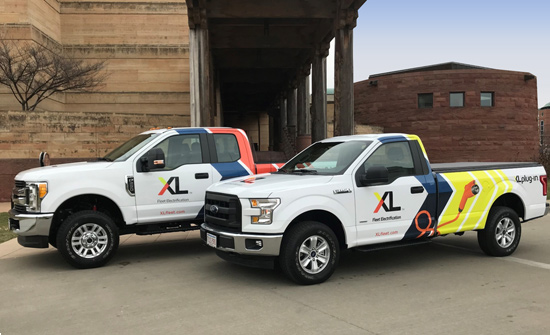Photo courtesy of XL Fleet.
XL was the first member of Ford’s e-QVM program in 2017. Its systems are currently available on Ford F-150 and F-250 (pictured), Ford E-350 and E-450, Ford Transit, Ford F-59 Super Duty, Chevrolet Express and GMC Savana, Chevrolet and GMC 3500 and 4500.
On Sept. 18, XL Fleet announced a merger with Pivotal Investment Corporation II, a publicly traded special purpose acquisition company (SPAC).
The combined company will be named XL Fleet and is expected to be listed on the New York Stock Exchange under the ticker symbol “XL.” The anticipated value of the company is about $1 billion, with the transaction expected to be completed in the fourth quarter.
Founded in 2008, XL Fleet is a provider of hybrid and plug-in hybrid powertrain conversions for U.S. and Canadian commercial fleet vehicles built by Ford, Chevrolet, GMC, and Isuzu.
While the overall fleet size with XL’s hybrid and plug-in hybrid systems to date is modest — topping out at an estimated 4,200 units when 2020 is complete — the company claims a client base of more than 200 customers, including FedEx, The Coca-Cola Company, PepsiCo, Verizon, the City of Boston, Seattle Fire Department, Yale University, and Harvard University. Those clients have driven a cumulative 130 million miles.
The combined company is expected to have about $350 million in net cash at closing. According to an investor presentation, XL expects to double its 2020 sales to over 9,000 units in 2021 and grow from there. Where and how?
XL will divide the cash for various initiatives. In addition to scaling existing organizational capacity and operations, other areas of focus will be product development, international expansion, exploration of “buy versus make” opportunities to accelerate product timelines, and development of applications, infrastructure, and vehicle financing under the heading of Electrification-as-a-Service.
On the product side, the merger will allow XL to accelerate its existing product pipeline in vehicle Classes 2 to 6 for existing clients as well as new ones, said Eric Foellmer, director of marketing. Going further, “This (deal) opens us up to explore new opportunities in Classes 7 and 8,” he said.
And it allows the company to widen beyond its hybrid and plug-in hybrid systems to fully electric options, which XL had already been developing, Foellmer said.
However, Foellmer doesn’t anticipate that XL will stray from its core business model, which is to integrate its electrified powertrain platform on existing chasses.
“We’ve been very successful as a powertrain-driven company, and we will continue to leverage chasses from OEM partners like Ford, GM, and Isuzu,” he said. “We’re not going to become a manufacturer that makes the entire vehicle.”
It has been a busy year with companies in the electrification space going public or on that path, particularly with SPAC mergers. (See Nikola, Lordstown Motors, Canoo, ChargePoint, Fisker). Foellmer made sure to point out that XL has been product-ready for years. “Rather than the promise of future product delivery as a result of this funding, we already have vehicles on the road,” he said. “We’ll be able to give (clients) access to a wider array of electrification solutions.”
When it comes to electrification, any unit penetration in wheels on the road is milestones ahead of other upstarts in the space. “We’re a real company with real products that we’re already selling to fleets,” Foellmer said.
by Chris Brown
Source: https://www.automotive-fleet.com
CUT COTS OF THE FLEET WITH OUR AUDIT PROGRAM
The audit is a key tool to know the overall status and provide the analysis, the assessment, the advice, the suggestions and the actions to take in order to cut costs and increase the efficiency and efficacy of the fleet. We propose the following fleet management audit.




